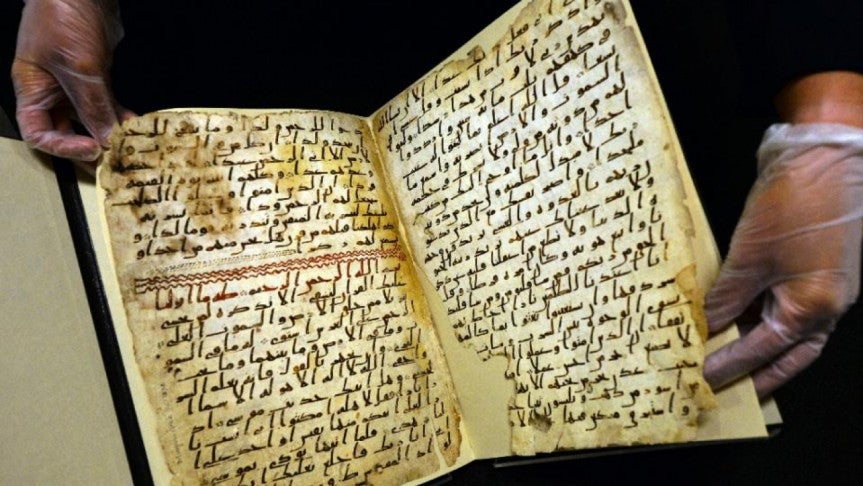Koran found in UK may have belonged to Prophet Mohammed’s friend Abu Bakr

A new research suggests the Koran manuscript found on 22 July at the University of Birmingham that has been carbon dated to close to the time of the Prophet Mohammed — making it one of the oldest in the world — may have belonged to Abu Bakr, one of the world’s first ever Muslims.
‘Radiocarbon dating carried out in July found the fragments to be at least 1,370-years-old, raising the possibility that it could be the oldest copy of the Islamic holy book in existence’, reported The Independent.
ow Jamal bin Huwareib, managing director of the UAE’s Mohammed bin Rashid Al Maktoum Foundation for Islamic studies, has suggested that such an early document could have been commissioned by a very small number of people – the most likely of them being Abu Bakr.’
‘Abu Bakr is widely understood to be the first person to convert to Islam outside the Prophet Mohammed’s direct family. He served as a friend and trusted advisor to the prophet and became the first ever Muslim caliph in 632, ruling for 27 months until his death 634.’
‘The age of the Birmingham Koran means it is likely to have been created in Islam’s very earliest years, when the world’s global Muslim population was only in the low hundreds.’
‘I believe this is the Koran of Abu Bakr,’ bin Huwareib told BBC News, adding: ‘It’s the most important discovery ever for the Muslim world,’
‘The quality of the Birmingham Koran’s parchment and handwriting suggests the 200 leaf document could only have been created for an incredibly important figure, he said.’
‘This version, this collection, this manuscript is the root of Islam, it’s the root of the Koran…This will be a revolution in studying Islam,’ bin Huwareib went on to say.
Not everybody is so convinced that the Birmingham Koran was Abu Bakr’s personal version on the holy book, however.
The two leaves of parchment, filled with ‘surprisingly legible’ text from Islam’s holy book, have been dated to around the early seventh century, the University of Birmingham said.
‘The tests carried out on the parchment of the Birmingham folios yield the strong probability that the animal from which it was taken was alive during the lifetime of the Prophet Mohammed or shortly afterwards,’ said David Thomas, professor of Christianity and Islam.
Describing it as a ‘startling result’, he added that the text is ‘very similar indeed to the Koran as have it today’.
‘This tends to support the view that the Koran that we now have is... very close indeed to the Koran as it was brought together in the early years of Islam,’ he said.
The leaves, held in the university’s Mingana Collection, contain parts of chapters 18 to 20, written with ink in an early form of Arabic script known as Hijazi.
‘This is indeed an exciting discovery,’ said Muhammad Isa Waley, lead curator for Persian and Turkish manuscripts at the British Library in London.

 NTV Online
NTV Online




